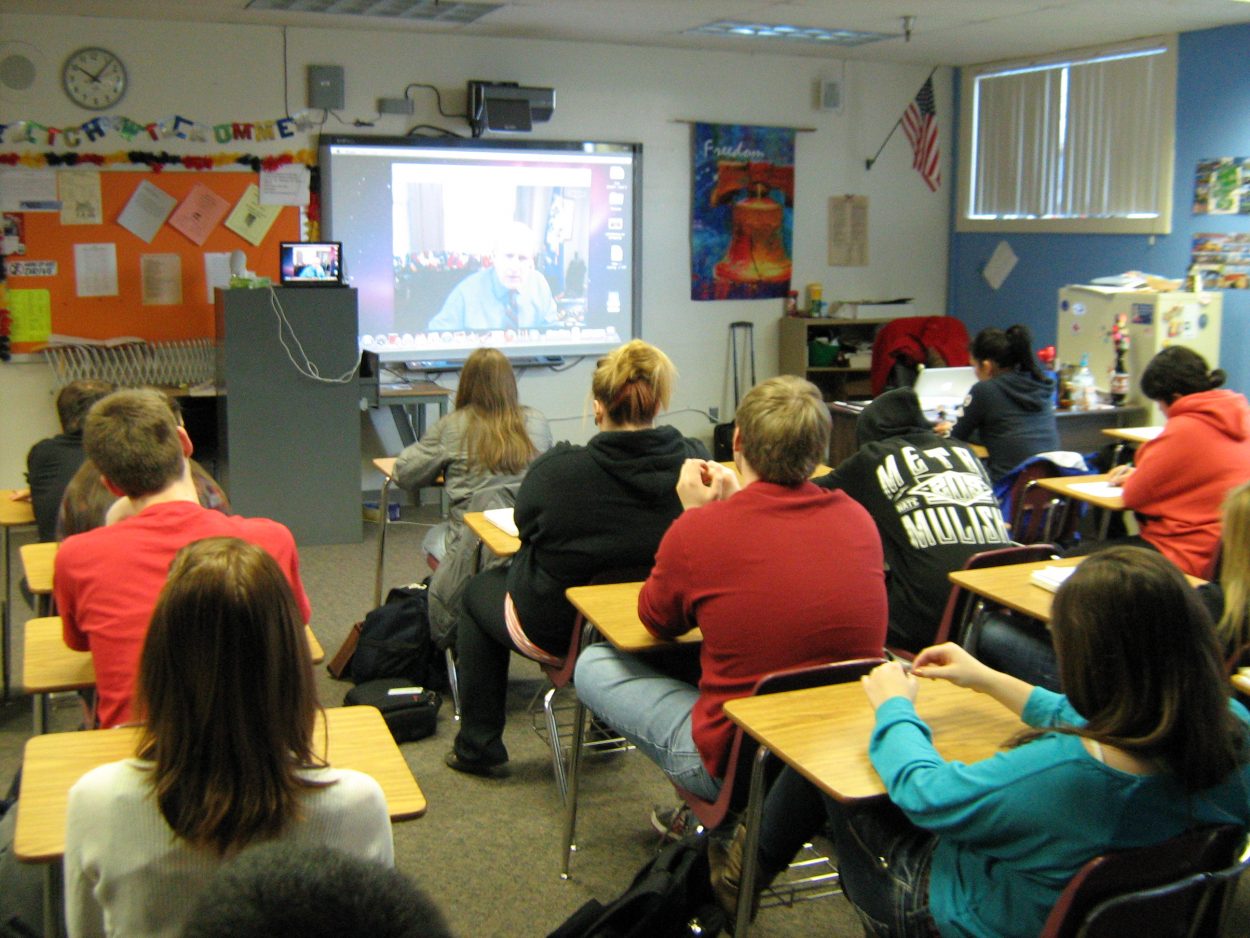Click here for iFriendly audio.
A Wrangell civics teacher and her class are taking a new approach to education. They are meeting and greeting top political experts across the country without ever leaving their classroom.
Tuesday they spoke via Skype with former comptroller general David Walker about America’s debt crisis.
“I’m coming to you from Bridgeport, Connecticut, so a long way away from where you are,” said Walker. “I now run a nonprofit organization focused on trying to tell the American people the truth about the financial condition of the U.S. government and what needs to be done in order to improve our economy, to generate more jobs, to make sure that we can deliver the promises that are being made, and not place undue tax burdens on young people like yourself [sic].”
Before going to work in the nonprofit sector, Walker served for ten years as the comptroller general of the United States. He was appointed to the position by then President Bill Clinton in 1998. He continued on through the George W. Bush administration before resigning in 2008.
During his tenure, Walker was the director of the Government Accountability Office which is responsible for keeping the federal government in check in terms of its use of public funds. It’s a big job, especially in times of financial turmoil.
That’s why, when Galla was looking for someone to speak to her class about the American fiscal situation, she couldn’t think of a better person.
“I only know as much as a teacher knows, so obviously there’s only so much I can teach on the national debt and specifics,” said Galla. “So Mr. Walker is an absolute expert on the debt—probably the expert on the debt, and I wanted him to be able to teach the kids directly rather than my trying to interpret. He would be able to talk to them directly and they could ask any question they wanted to, directly to him.”
For Walker, there were a few reasons why Galla’s invitation caught his attention.
“Well, first they approached me to be able to speak,” said Walker. “Secondly, believe it or not, Alaska is the only one of the 50 states that I haven’t made a fiscal presentation in. And thirdly, I think that young people in particular need to be more informed and involved in this issue because it’s their future. They’re the ones that are going to end up paying the price. They’re the ones that are going to end up bearing the burden if our elected officials fail to act.”
Back in the classroom, the students sat at their desks with their attention on a large screen at the front of the room and a laptop on a cart off to the side. There, larger than life on that screen, was Walker, sitting behind a wooden desk that looks to be in an office. He asked the students to raise their hands if they could hear him. He smiled as he saw—via his computer–hands fly into the air thousands of miles away. He started off his lecture by comparing the two states.
“Alaska is in the best fiscal shape and financial condition of all 50 states,” said Walker. “It ranks number one. It has the highest positive net assets per taxpayer of any state in the union. So it’s number one. And, unfortunately, the state that I live in, Connecticut, it’s number 50.”
He went on to explain subjects as complex as the fiscal cliff to the students, who sat in rapt attention for over a half an hour. Once he finished his talk, he invited them to come up to the laptop and ask him any questions they have. Despite delays with the internet connection due to last week’s earthquake, he made sure every question was answered thoroughly.
After the Q and A session finished, he reflected on the experience of lecturing in front of a virtual classroom.
“We did have some technical problems during part of the presentation,” said Walker. “But I do think that leveraging technology is a very effective way to be able to reach people all around the world and to be able to bring people that otherwise may not have the time or the ability to travel to a particular location to present and interact with people in different parts of the country, in different parts of the world, in a very cost-effective manner.”
Student Sharon Gronlund, who asked Walker several questions just minutes before, also thought the class was a success.
“It’s just an awesome opportunity to be able to do this,” said Gronlund. “It’s kind of cool because you never see this in any other small towns anywhere. It’s a new thing for us, really.”
These were golden words for Galla, who was visibly excited by her students’ enthusiasm.
“What my hope for my own students is that they develop a good depth of understanding about the United States government and their politics and their policies and so forth,” said Galla. Because they’re going to graduate and that’s going to be something that hopefully will impact them. My main goal that I have is that I hope that our students become active, engaged, citizens and that they know how to stand up for their rights and they know how to make policy changes when they believe that they are necessary.”
Judging by the response of student Victoria Ingram, these young citizens might just be on the right track.
“Just the fact that this makes us just higher up, to be able to deal with things, and what to do, and if anybody goes into, you know, a field where they want to help this, they may even make their choices based on this class.”











